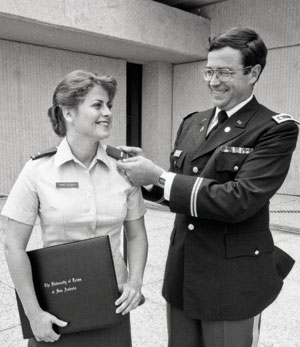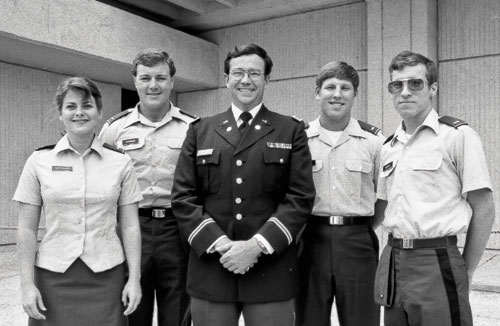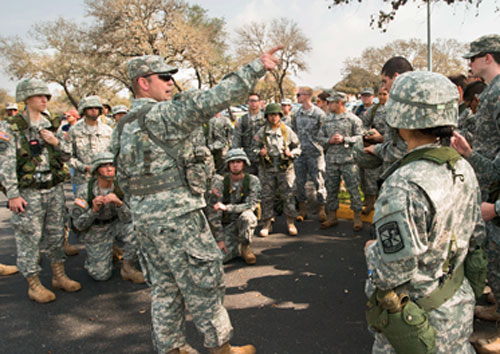
Three Decades of Service
Thirty years ago, they were young recruits trying to find their way along the path of career advancement. One played the baritone in the Army Band. Another found his calling in the computer room. A third was pursuing a dream seeded years earlier by uplifting recruiting films.
They all recognized that college degrees would open doors for them and that UTSA's new Reserve Officer Training Corps, ROTC, offered them unparalleled opportunities in the armed forces.
They probably did not pay much attention to it at the time, but the 19 men and women who went through that training made school history when in May 1982, they pinned on gold bars and were commissioned second lieutenants, the first ROTC graduates produced by UTSA.
But now, three decades have passed and the members of that inaugural ROTC class look back with satisfaction and perspective at the milestone they achieved, both for themselves as individuals and for their alma mater.
UTSA, meanwhile, has seen its officer preparation program prosper. About 30 aspiring career officers every year capitalize on scholarship offers and career assistance and earn their commissions. The ROTC program is recognized as one of the most productive in the state, said Lt. Col. Scott Sonsalla, professor of military science and director of the university's ROTC program.
"We used to be the stepchild of St. Mary's [University]," said Sonsalla, reflecting on the earliest days of officer training in San Antonio, when UTSA's program was a detachment of the ROTC program at St. Mary's. "Now, we are the premiere ROTC program in South Texas."
Typically, UTSA has about 180 members in its ROTC battalion, and it nurtures hundreds more through its connections with Junior ROTC programs on about 50 high school campuses in the region, he said. His staff of 14 also offers instruction at regional community colleges.
Graduates from that first class said the ROTC program not only gave them financial assistance, but also provided a career path and instilled a patriotic pride that gave them a direction in life.
“The experience at UTSA shaped my life and career,” said Michael Burns, a retired Army lieutenant who came to UTSA to pursue a criminal justice degree. "Without the guidance of the professors and mentors, I would not have accomplished so much in my life.”
Burns met his wife, Karen, while finishing his degree, and together they embarked on a life of adventure that took them to stations around the U.S. and the Middle East.
Perhaps the most formative of these was an assignment to Alaska in 1987, where the avid outdoors man fell in love with the majestic scenery and the lifestyle. When he left the Army in 1994, Burns and his wife moved to that state, where he began a second career as a detective with the Anchorage Police Department.
William "Skip" Pope, a retired Army captain, earned a degree at UTSA in data systems management and then spent a career in military intelligence. He traveled the world to help soldiers who had stumbled into pay and promotion issues. He was assigned to the National Security Agency during Operation Desert Shield in Iraq.
"I've had an interesting life,” he said. "Part of the reason I stayed in the Army is because you are always doing something different, and making a difference,” Pope said. "When I signed up for ROTC in 1982, who would have known I would end up at the NSA?”
William Layden began as an enlisted recruit and a member of the Army Band in the late 1970s. He enrolled at UTSA to earn his education degree and then joined the National Guard.
"I always wanted to be a commissioned officer and fly in the Guard,” he said.
With his ROTC commission, Layden was able to do just that. He attended flight school and spent 10 years on active duty with the Army, including service as the pilot of a medical evacuation helicopter during Operation Desert Storm in 1991.
San Antonio native Gloria Hansmann remembers sharply dressed recruiters coming to Fox Tech High School in the mid-1970s with tales of an exciting life in the armed forces. The all-volunteer military was relatively new and there was a push to get women to join.
"The Air Force showed us a film of all the planes, and all the jobs we could have, and I thought, ‘I want to do that,’" she said. But instead, she quit high school, took a civil service job and joined the Army reserve. Soon she ran into career roadblocks. "In both jobs, they required a degree to get any more promotions. I told my husband, ‘I have to go back to school and finish this’."
She remembers her ROTC training at UTSA as a time of self-discovery and commitment to the Army as a way of life. "I wanted more than what I had," she said. "I definitely gained military knowledge and definitely learned to be a leader."
Hansmann worked as a quartermaster and got to supervise Army installations around the world. She left in 1992, but after three years of missing the lifestyle, she rejoined the reserve, serving as an evaluator in a recruiting unit until 2010. The military has been the cornerstone of her life
"Once you join, in your heart, you become part of the corps," she said. "You pledge your life to it. It is a thing you commit yourself to totally."
–Cindy Tumiel



